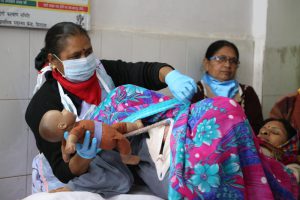Each year, the 5th of May is dedicated to midwives around the world. Midwives that birth thousands of babies, take care of mothers, and save lives. On this day, we celebrate successes in maternal and child health worldwide. Successes that couldn’t be possible without midwives. We also use this day as a reminder that all women have a right to safe, dignified care during childbirth, and midwives are essential in making that happen. This year’s theme of the International Day of the Midwife is “Women and Newborns: The Heart of Midwifery”. To celebrate this, we’ve asked Amelia Christmas to tell us what being a midwife means to her. Amelia is a Nurse-Midwife and holds a Master’s degree in Nursing from Christian Medical College in Vellore, India. She works on PRONTO International’s large collaborative implementation Nurse Midwife Training project in Bihar, India. Read on to discover what being a midwife means to Amelia.
What does being a midwife mean to me?
This is a profound question, which reminds me of some of the most beautiful moments in my professional life, as well as a few difficult ones. I can say at the end of it all, helping mothers bring life into this world is extremely rewarding.
When asked who a midwife is, I would probably say a licensed health care professional who is legally responsible to care for a woman during pregnancy and labor. I came to Bihar hoping to fill that role. However, as I began working, the definition of a midwife shifted, its boundaries expanding.
“Being a midwife means that I am an advocate for women”.
With each new day, I awake to the responsibility of the lives I will be accountable for and I whisper a prayer. Every pregnant woman has two lives in her. With the limited resources we have, we have to do everything we can to provide the best care possible so both mother and her baby thrive. In the setting where I work, care providers and hospital administrators often disappear due to fear of public outcry when there is an unfortunate event during childbirth, leaving the patient alone. To me, demonstrating accountability for women and their babies wellness is a moral obligation that I take very seriously.
“Being a midwife means that I get to take part in miracles”.
The sound of a baby’s first cry is the most beautiful and fulfilling event on any given day. We have a saying among the midwife mentors in Bihar, “the women in Bihar have a lot more grace from God than women anywhere else, because the mothers and their newborns survive the worst circumstances when [the care providers] can do so little.” I have attended births where the baby doesn’t cry immediately. These times are always stressful and every precious minute seems like an hour. Once, I had almost lost hope. However, after continuous resuscitation efforts, the baby’s heart rate jumped to 120 and above in the first golden minute and the baby regained color and she started breathing normally. We all had tears in our eyes.
“Being a midwife means that I am the person families entrust”.
Elder woman in the family is expected to be the most knowledgeable about childbirth because when home deliveries were the norm, these were the woman managing deliveries. Recently, in an effort to improve health outcomes of women and newborns, the government began encouraging women to deliver at the facility through incentives. However, health facilities are feared and considered unfriendly by many women in the surrounding communities. By treating birthing women with empathy and by understanding that their fears and hopes are normal, I am able to build trusting relationships. This deepens the connections between communities and health facilities, encouraging more women to come to the hospital to receive the skilled care they deserve during childbirth.
“Being a midwife means that I have a role in empowering women by listening to them and helping them voice their views”.
Often times, we come across situations when the family does not accept a female child due to misconceptions and cultural norms, forcing the mother to also dislike and ignore her child. Most of the time, the mother is being pressured to disown her own child. Listening to her and counseling her help her make a better decision for her family and her child.
On this 2016 International Day of the Midwife, I reflect on my expanded definition of who a midwife is. This expanded definition includes not only the technical skills needed to care for women and babies, but also being an advocate, being an example to other providers, being the person that families come to for answers, and empowering women by listening with empathy. I also reflect on what a beautiful experience I’ve had as a midwife. I will always cherish working with women and newborns.
Comments are closed.






